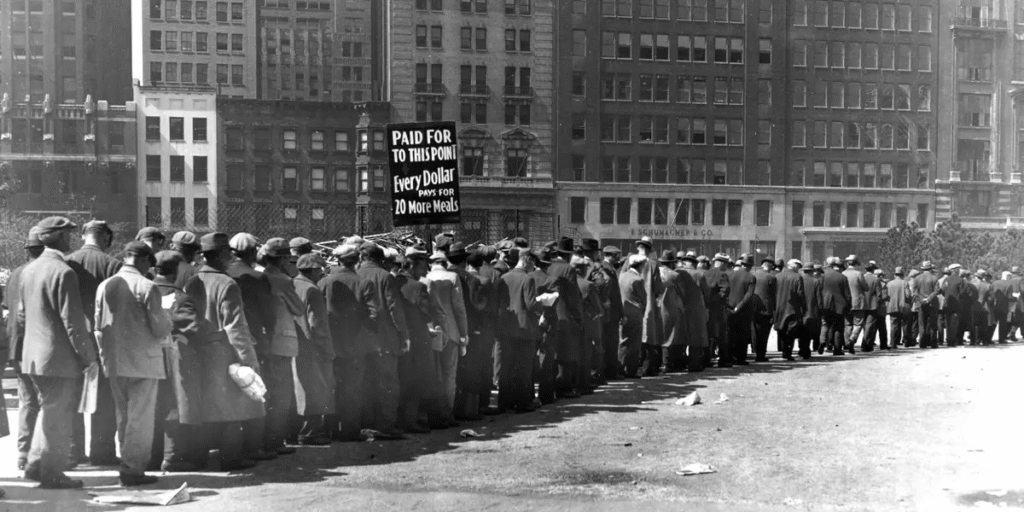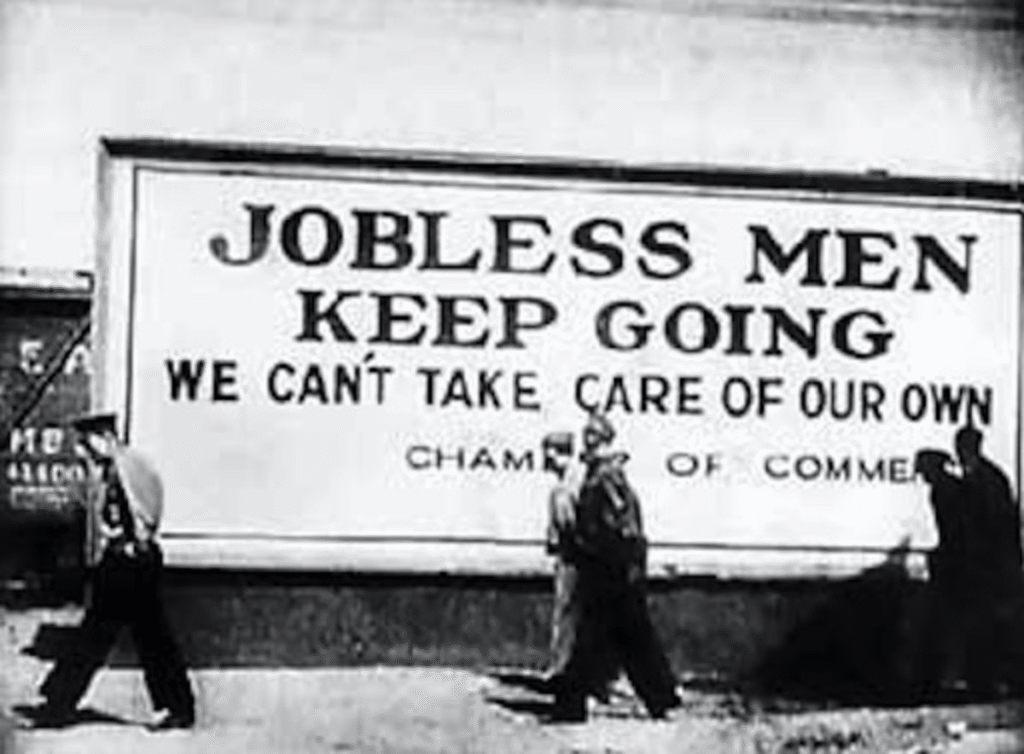Imagine this: It’s the year 1929. You’ve just bought yourself a shiny radio, your dad says business is booming, and folks in town are smiling because jobs are steady. But then — like a chair breaking under too much weight — the whole money system of America suddenly collapses.
That, my dear friend, was the beginning of what we call the Great Depression. It wasn’t just a bad week or even a bad year. It was the hardest, longest economic slump the country had ever faced. And the lessons from it? Well, they’re worth listening to, because money can be tricky, and history likes to repeat itself if we don’t pay attention.
Table of Contents
How Long Did the Great Depression Last?

The Great Depression wasn’t like a storm that passed overnight. It lasted for about 10 long years, starting in 1929 and stretching all the way until the early 1940s. For some families, it felt endless.
In fact, some people say it only really “ended” when World War II came along, because the war put factories back to work and gave people jobs again. Can you imagine waiting that long for things to get better? A whole childhood could pass by in those years.
What Really Happened During the Great Depression

So, what was life like? Let me paint you a picture.
- Banks ran out of money, so families couldn’t get back their savings.
- Jobs disappeared. Imagine whole factories shutting down overnight.
- People stood in long lines, waiting for bowls of soup or bread.
- Farmers grew food but sometimes couldn’t even sell it, because no one had money.
It wasn’t all doom and gloom, though. Neighbors leaned on each other. Families shared meals, kids helped out by taking odd jobs, and people learned how to “make do” with what little they had. Some even said it brought families closer, because everyone had to pull together.
What Was the Actual Reason for the Great Depression?

Now, let’s get to the “why.” Why did this happen?
Think of the economy like a tall stack of dominoes. Everything was standing fine, until one piece got knocked over — and then the rest came tumbling down.
- First, the stock market crash in October 1929. Too many people borrowed money to buy stocks, and when prices fell, they couldn’t pay it back.
- Banks had lent out too much and didn’t have enough saved, so many shut down.
- With banks failing, people got scared and stopped spending money.
- When people stopped buying, businesses closed, leading to job loss.
- And since America traded with other countries, the pain spread worldwide.
It wasn’t just “one thing.” It was many small mistakes adding up to one giant mess.
What Happened on the First Day of the Great Depression?

People call it “Black Thursday” and later “Black Tuesday.” Those days in October 1929 were when the stock market went wild. Prices fell faster than folks could sell their shares.
Picture Wall Street in New York City: telephones ringing, men in suits sweating and yelling, papers flying through the air. A shopkeeper who thought he’d retire rich saw his life savings vanish in one afternoon. Families that thought they were safe suddenly weren’t. That first crash day was like the ground cracking beneath America’s feet.
Who Did People Blame for the Great Depression?

When bad times come, folks like to point fingers. Back then, people blamed:
- Bankers and Wall Street investors for being greedy.
- The government for not stepping in sooner.
- The President at the time, Herbert Hoover, for seeming too quiet while people struggled.
- Sadly, some even blamed immigrants or poor folks, which wasn’t fair at all.
Blame was everywhere, but solutions were slow.
Where Did All the Money Go in the Great Depression?

Here’s the funny thing: the money didn’t just “vanish into thin air.” It’s more like it got stuck in places people couldn’t reach.
- When banks failed, people’s savings were locked up or gone.
- Businesses had no money to pay workers.
- Folks who still had cash hid it under mattresses instead of spending it.
So shops closed because no one was buying, and jobs dried up because shops weren’t open. It was like a giant freeze on the flow of money.
Who Lost It All During the Great Depression?

Most of the pain was felt by ordinary people.
- Farmers lost their land when they couldn’t pay loans.
- Factory workers got laid off.
- Families lost homes and had to live in makeshift camps called “Hoovervilles.”
It was heartbreaking. Kids saw their parents cry, and sometimes older children left home to find work on farms or railroads just to help their families survive.
Who Got Rich During the Great Depression?

Believe it or not, some people still made money.
- Wealthy folks like Howard Hughes who had saved cash could buy land, houses, or stocks dirt cheap.
- Some industries, like Hollywood movies, actually grew—because people wanted a little escape from their hard lives.
- A few smart investors bought when everyone else was scared, and they came out richer later.
But they were the exception, not the rule. For most, these were lean years.
How Did People Survive During the Great Depression?
This is the part of the story where human grit shines.
- Soup kitchens and breadlines: Charities and churches gave out free meals.
- Odd jobs: Teens shined shoes, carried groceries, or did farm work.
- Bartering: People traded eggs for flour, or clothes for tools.
- The New Deal: Later, the government created programs to give jobs, build roads, and keep people afloat.
Most importantly, families and neighbors leaned on each other. They planted gardens, shared food, and found joy in small things, like listening to the radio or telling stories by candlelight.
Who Saved the Great Depression?

If we’re telling this like a story, here comes the “hero.”
President Franklin D. Roosevelt (FDR) took office in 1933 and promised a “New Deal” for the people. His programs helped create jobs, supported farmers, and gave folks hope again.
But, truth be told, the Depression didn’t fully end until World War II. Factories started making weapons, clothes, and supplies for the war, and suddenly, millions of jobs came back.
Can the Great Depression Happen Again?
Could we see another Depression like that today? Probably not in the same way, and here’s why:
- We now have rules to protect banks and savings.
- The government can step in faster with programs to help.
- People have safety nets like unemployment insurance and social security.
But smaller money troubles, called recessions, still happen. That’s why learning the lessons from the 1930s is so important.
Lessons Learned from the Great Depression
Here’s what we learned, wrapped in simple truths:
- Save when times are good, so you have something in bad times.
- Don’t gamble too much with money you can’t afford to lose.
- Take care of your community—neighbors helping neighbors kept many people alive.
- Strong rules and safety nets matter, so everyone has a chance to get back up.
Conclusion – Wrapping Up the Story
The Great Depression wasn’t just about money. It was about people. Ordinary folks who lost almost everything, but kept going. Families who sang together at night, even when the cupboard was bare. Neighbors who shared bread and hope.
It lasted nearly a decade, but it didn’t break America. In fact, it made people tougher, wiser, and more careful about money.
So next time you hear your grandparents say, “Save your pennies,” or “Don’t waste food,” now you know where that wisdom came from.
And here’s something to think about: If you were living in the Great Depression, what’s one small thing you’d do to help your neighbor?


